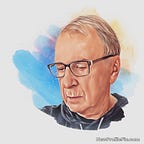Return to New Mexico — chapter concluded
(from Hand on the Shoulder: Finding freedom in the confluence of love and career.)
This is the second part of a chapter from my book, Hand on the Shoulder: Finding freedom in the confluence of love and career. I’ll be publishing more articles from the book over the coming weeks and months. If you want to read the whole book, look it up on Amazon or other sources.
Grant
Human lives are backwards. Wisdom should come at an early age, when choices are abundant and opportunities abound. We need wisdom to make early decisions, not late when the choices are only part of murky memories. How do we detect and understand the stream of culture and tradition that sweeps us along restricting our choices, dictating right and wrong, like an electron whose path is predetermined when propelled through a magnetic field?
I didn’t know enough, understand enough to avoid the magnetic field. I had good parents, a loving home, a family that loved me. That set a high bar, a bar I wanted to reach. I did not want to disappoint them. How could I possibly fail to live up to those standards?
It is up to each person to determine their own path, to understand their own values, to set their own goals, to overcome obstacles, to reach out for help and perspective when we need it. At every turning point, counsel from other wise people could have shown a bright light on the decisions, illuminating new alternatives, highlighting unexplored consequences.
My downward spiral stopped when I began reaching out to others for friendship and help, opening up to my feelings and vulnerabilities, and forgiving myself and others for not meeting the false standards I had set. Moving to a new country forced me to learn new rules, new cultures, new people, and helped tune my internal and external senses to what was happening around me.
Defining oneself is a lifetime quest. “Who am I?” does not have one answer, but has a different, evolving answer each day as one learns and develops. Sometimes that evolution is slow, other times, rapid. The slowest are the times when we are drifting, visionless. The rapid are the times when we are exploring, turning every encounter into a learning experience. Ultimately, finding oneself requires deep relationships with others, talking, sharing, having substantive discussions, and learning together.
Every day brings new experiences, new exposures, each of which can be a turning point, depending on the kind of decisions we make at each intersection. Those decisions may seem unimportant at the time, but might have profound impact on ourselves and the people around us. Each person makes thousands of decisions every day, most are small automatic choices. Choosing what socks to wear is unlikely to change a person’s life, but other decisions could put us on a significantly different path. Learning to tell the difference is an important skill.
We can learn to recognize decisions to accept or reject a new opportunity as important turning points, but other incidents may not be so clear. Meeting a stranger in an airport or a hotel, for instance. Random events open new doors, shedding new light on a person’s direction. Every new experience or encounter contains the possibility for growth and learning. Attitude is important. Do we recognize new encounters as opportunities or threats? Do we face them with fear or enthusiasm? A “possibilities” attitude leads to growth.
The number of opportunities we experience depends on the number of interactions and experiences we create. Traveling, reading new books, attending concerts, and other activities increase our encounters with other people. Courage and curiosity can turn those encounters into rich new opportunities.
Yet, our choices have consequences. Other people are involved. Deciding to move or take a new job affects not just the immediate family, but also friends and family in the present location and those in the new location. Some of those people may be losing important relationships while others are gaining them. Analyzing those impacts is a complex task, but a task often not considered in depth when making a decision. How do we know who will be hurt and who will gain? Talking to people affected can provide, at least, a partial answer, but the unintended consequences or long term effects often cannot be known.
As the author, John Reese, said, “In the end we’re all alone and no one’s coming to save you.” But before the end, being alone is a choice. Reaching out to develop warm, trusting relationships with others is the solution for bad choices, loneliness, and cultural dissonance.
